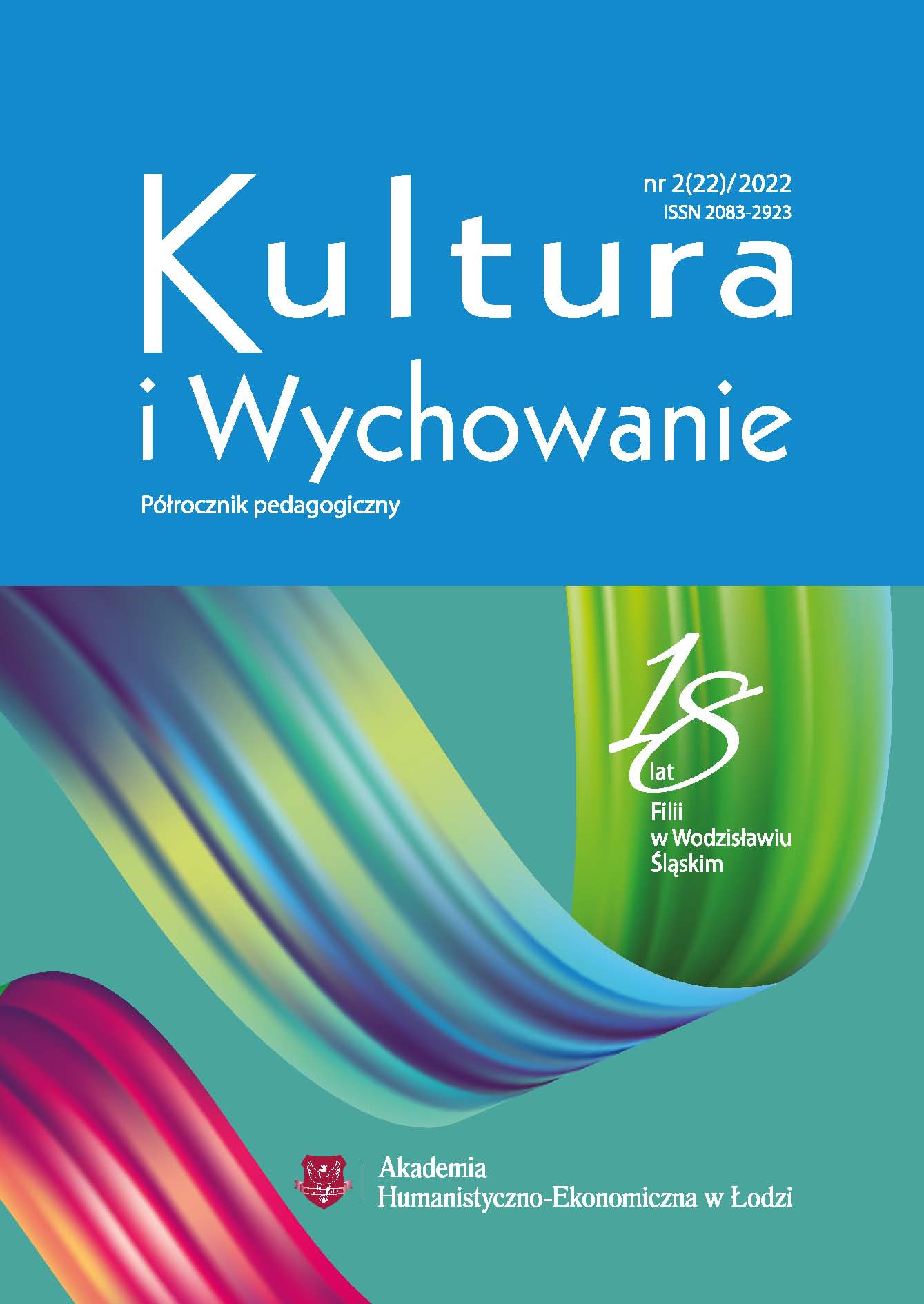Sharenting – between a parent’s right to express themselves on social media and the protection of a child’s privacy
DOI:
https://doi.org/10.25312/2083-2923.22_04mkKeywords:
sharenting, social media, parentingAbstract
The aim of this article is to present the phenomenon of sharenting. Referring to selected research reports conducted in this field both in Poland and worldwide, the motives of parents who share information, photos and films about their child via social media are indicated. Next, the benefits and dangers that may result from sharenting activities were considered. It concludes by pointing out the need for educational activities designed for parents relating to the sensible posting of sensitive content on social media.
Downloads
References
Abidin C., Micro microcelebrity: Branding Babies on the Internet, “M/C Journal” 2015, vol. 18(5), https://doi.org/10.5204/mcj.1022
Ammari T., Kumar P., Lampe C., Schoenebeck S., Managing children’s online identities: How parents decide what to disclose about their children online, “Proceedings of the 33rd annual ACM conference on human factors in computing systems. Association for Computing Machinery” 2015, s. 1895–1904, https://doi.org/10.1145/2702123.2702325
Ammari T., Schoenebeck S., Morris M., Accessing Social Support and Overcoming Judgment on Social Media among Parents of Children with Special Needs, “Proceedings of the International AAAI Conference on Web and Social Media” 2014, vol. 8(1), s. 22–31,https://doi.org/10.1609/icwsm.v8i1.14503
Barani K., Wirtualne wspólnoty kobiet na forach internetowych jako źródło wsparcia w przygotowaniu do macierzyństwa, [w:] B. Szmigielska (red.), Całe życie w sieci, Wydawnictwo Uniwersytetu Jagiellońskiego, Kraków 2008.
Bartholomew M.K., Schoppe‐Sullivan S.J., Glassman M., Kamp Dush C.M., Sullivan J.M., New parents’ Facebook use at the transition to parenthood, „Family Relations: An Interdisciplinary Journal of Applied Family Studies” 2012, vol. 61(3), 455–469, https://doi.org/10.1111/j.1741-3729.2012.00708.x
Benedetto L., Ingrassia M., Digital Parenting: Raising and Protecting Children in Media World, [w:] L. Benedetto, M. Ingrassia (red.), Parenting – Studies by an Ecocultural and Transactional Perspective, IntechOpen, 2020, https://doi. org/10.5772/intechopen.92579
Bierca M., Wysocka-Świtała A., Sharenting po polsku, czyli ile dzieci wpadło do sieci?, Wydawnictwo Clue PR, 2019.
Blum-Ross A., Livingstone S., “Sharenting,” parent blogging and the boundaries of the digital self, “Popular Communication” 2017, vol. 15(2), s. 110–125, https://doi.org/10.1080/15405702.2016.1223300
Błasiak A., Narracje rodziców w przestrzeni mediów społecznościowych – zarys problematyki na przykładzie zjawiska sharentingu, „Biografistyka Pedagogiczna” 2019, nr 1(4).
Brosch A., Celebryci w skali mikro: lansowanie dzieci w serwisie internetowym YouTube, „Chowanna” 2018, t. 1, s. 77– 92.
Brosch A., Sharenting – nowy wymiar rodzicielstwa?, [w:] H. Krauze-Sikorska, M. Klichowski (red.), Świat małego dziecka. Przestrzeń instytucji, cyberprzestrzeń i inne przestrzenie dzieciństwa, UAM, Poznań 2017.
Chrostowska B., Sharenting – skala i wielowymiarowość zjawiska (nierozważnego) ujawniania przez rodziców informacji o dzieciach w mediach społecznościowych, „Problemy Współczesnej Edukacji” 2018, nr 4(43).
Ciołkiewicz P., „Brawo ja”, czyli wszyscy jesteśmy narcyzami, „Interdyscyplinarne Studia Społeczne” 2016, nr 1(1).
Cowan C.P., Cowan P.A., When partners become parents: The big life change for couples, Basic Books, New York 1992.
Damkjaer M.S., Sharenting = good parenting? Four Parental Aproaches to Sharenting on Facebook, [w:] G. Mascheroni, C. Ponte, A. Jorge (red.), Digital Parenting: The Challenges for Families in the Digital Age, Yearbook 2018, Nordicom, University of Gothenburg, Gothenburg 2018, s. 209–218.
Gibson L., Hanson V.L., Digital motherhood: How does technology help new mothers?, “Proceedings of the SIGCHI conference on human factors in computing systems, Association for Computing Machinery” 2013, s. 313–322, https://doi. org/10.1145/2470654.2470700
Kierzkowska M., Media a pogłębianie cech narcystycznych u dzieci, [w:] B. Rola (red.), Jej wysokość dziecko, Difin, Warszawa 2020.
Kopecky K., Szotkowski R., Aznar-Díaz I., Romero-Rodríguez J.M., The phenomenon of sharenting and its risks in the online environment. Experiences from the Czech Republic and Spain, “Children and Youth Services Review” 2020, vol. 110.
Kusio U., Współczesna kobieta wobec macierzyństwa, „Kultura i Edukacja” 2004, nr 4. Latipah E., Kistoro H.C.A., Hasanah F.F., Putranta H., Elaborating Motive and Psychological Impact of Sharenting in Millennial Parents, “Universal Journal of Educational Research” 2020, vol. 8(10), s. 4807–4817, https://doi.org/10.13189/ ujer.2020.081052
Levy E., Parenting in the Digital Age: How are We Doing?, report, Parent Zone: Making the Internet work for Families, London 2017, https://parentzone.org.uk/sites/ default/files/2021-12/PZ_Parenting_in_the_Digital_Age_2017.pdf [dostęp: 12.09.2021].
Lipu M., Siibak A., ‘Take it down!’: Estonian parents’ and pre-teens’ opinions and experiences with sharenting, “Media International Australia” 2020, vol. 170(1), s. 57–67, https://doi.org/10.1177/1329878X19828366
Marasli M., Suhendan E., Yilmazturk N.H., Cok F., Parents’ shares on social networking sites about their children: sharenting, “Anthropologist” 2016, vol. 24(2), s. 399–406, https://doi.org/10.1080/09720073.2016.11892031
Olcoń-Kubicka M., Rola Internetu w powstawaniu nowego modelu macierzyństwa, [w:] M. Sikorska (red.), Być rodzicem we współczesnej Polsce: nowe wzory w konfrontacji z rzeczywistością, Wydawnictwa Uniwersytetu Warszawskiego, Warszawa 2009.
Polak Z. (red.), Cyfrowy świat małego dziecka, seria „Internet – Edukacja – Bezpieczeństwo”, NASK – Państwowy Instytut Badawczy, Warszawa 2021.
Ranzini G., Newlands G., Lutz C., Sharenting, Peer Influence, and Privacy Concerns: A Study on the Instagram-Sharing Behaviors of Parents in the United Kingdom, “Social Media + Society” 2020, vol. 6(4), https://doi. org/10.1177/2056305120978376
Robiatul Adawiah L., Rachmawati Y., Parenting Program to Protect Children’s Privacy: The Phenomenon of Sharenting Children on social media, “Jurnal Pendidikan Usia Dini” 2021, vol. 15(1), s. 162–180, https://doi.org/10.21009/JPUD.151.09
Siibak A., Traks K., The dark sides of sharenting, “Catalan Journal of Communication and Cultural Studies”, April 2019, vol. 11(1), s. 115–121. Szpunar M., Kultura cyfrowego narcyzmu, Wydawnictwo AGH, Kraków 2016.
Źródła internetowe
https://www.lutzker.com/sharenting-precautions-and-consequences-of-creating-achilds-digital-footprint/ [dostęp: 19.09.2021].
AVG Technologies, ‘AVG Digital Diaries – digital birth’, AVG Technologies, 24 June 2010, http://www.avgdigitaldiaries.com/post/6874775716/digital-diaries-digital-birth-celebrating [dostęp: 7.09.2021].
Parents on Social Media: Likes and Dislikes of Sharenting, „C.S. Mott Children’s Hospital National Poll on Children’s Health” 2015, vol. 23(2), https://mottpoll.org/ reports-surveys/parents-social-media-likes-and-dislikes-sharenting [dostęp: 7.09.2021].
Nominet, 2018, https://www.nominet.uk/2-7m-parents-share-family-photos-complete-strangers-online/ [dostęp: 7.09.2021].
Downloads
Published
Issue
Section
License
Copyright (c) 2023 Akademia Humanistyczno-Ekonomiczna w Łodzi

This work is licensed under a Creative Commons Attribution-ShareAlike 4.0 International License.

